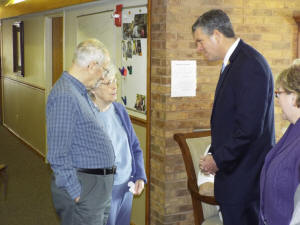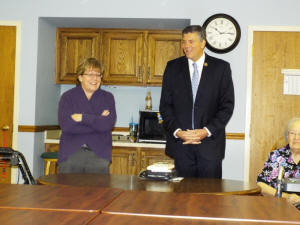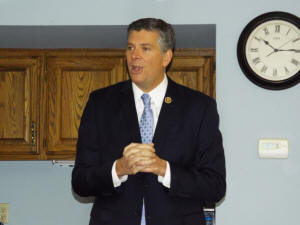
LaHood arrived shortly after 10 a.m. and spent a few minutes
visiting with residents who were in the congregate dining area. He
then moved on to the meeting location where he was introduced by
Village Administrator Jo Hilliard to about a dozen seniors in
attendance.

LaHood began by giving the residents a little bit of information
about himself. His hometown is Dunlap, located in Peoria County. He
earned his seat in the House of Representatives through a special
election (after the resignation of Aaron Schock) held in September
of 2015. As a freshman Representative, LaHood witnessed the first
ever visit to Washington D.C. by the Pope. Also since, his election
to the office, Speaker John Boehner has resigned, something LaHood
would later say was an event that needed to happen.
To date, LaHood said two of the biggest legislative events he has
been involved in are the passing of the Transportation and Education
Bills. LaHood voiced that, in his opinion, the largest issues before
the federal government are the economy and national security. He
said that ISIS and Jihad were serious concerns. He also supports
implementing a higher level of scrutiny concerning who is allowed to
enter the United States from foreign countries. He told the group
that public safety has to be the number one concern.

And finally, with tongue in cheek, he asked the group to please not
ask him any questions about Donald Trump, which drew light chuckles
from the attendees.
LaHood then opened the floor for questions. The first question from
the group was how can Washington do away with gridlock? LaHood said
it was time for Boehner to move on, and the new speaker (Paul Ryan)
was an improvement. LaHood said the new speaker is committed to
“Regular Order,” which means that any member of the House,
regardless of party, will be able to offer legislation and
amendments to bills, something they have not been permitted to do in
the past. LaHood said Ryan will also bring greater transparency to
the House, which is vital.
[to top of second
column] |
LaHood was then asked how long it takes to pass a bill. He said
it depended on the bill. He explained that bills such as Tax Reform
were complicated, take a lot of work, and a lot of time to pass,
while other bills are less complex and can be passed quickly and
easily. He added that the government does need to do a better job of
simplifying and explaining issues so that the American people can
understand and follow along in the process.

In fielding a question about the agricultural industry, LaHood said
that he currently does not serve on the Ag Committee. As a freshman
representative, he was appointed to the Natural Resources Committee;
and the Science, Space, and Technology Committee. He does want to be
on the Agriculture Committee and is hopeful that if/when he wins his
next election, he may have the opportunity to serve on that
committee as well as the Transportation Committee.
LaHood noted that there is a great deal of anxiety in the
agricultural industry right now. He noted that District 18 is the
ninth largest agricultural district in the United States, so it is
important to him that he be a part of the process there.
He talked briefly about a new bill being introduced, the
Trans-Pacific Partnership (TPP), which would open up a new market in
the Southeast Asia territory. LaHood said he intended to study the
bill, and there would be committee meetings with testimony from the
agricultural organizations such as the Farm Bureau and the Corn
Growers Association.
LaHood noted, “When we have free and open trade, our farmers can
compete with anybody in the world. We have the best, most efficient
and effective farm operations anywhere in the world. And, the most
important part of it is making sure that we have fair and open
trade, that people aren’t manipulating the currency like the Chinese
have done.”
As time was running out, LaHood did comment on a very controversial
issue for farmers throughout the country, the Waters of the U.S. (WOTUS)
rules that the U.S. Environmental Protection Agency is trying to
implement. (In recent days, both the U.S. House and Senate have
voted against the WOTUS. However, on January 20th President Obama
vetoed “Senate Joint Resolution 22, disapproval of the EPA’s Waters
of the United States rule.”)
LaHood said he was opposed to the WOTUS movement, and would continue
to fight against it.
During the conversation, LaHood said that he was attending another
meeting in Lincoln on that day, Thursday. He would be at the Logan
County Extension office for a meeting of the 18th District Ag
Advisory Committee. There he would speak with producers and others
in agriculture-related fields about issues that are impacting
farmers in the district.
When the question and answer session was over, LaHood spent a few
minutes speaking with residents one-on-one before moving on to his
next appointment.
LDN will have coverage of the Ag Advisory Committee meeting in its
Monday edition.
[Nila Smith] |